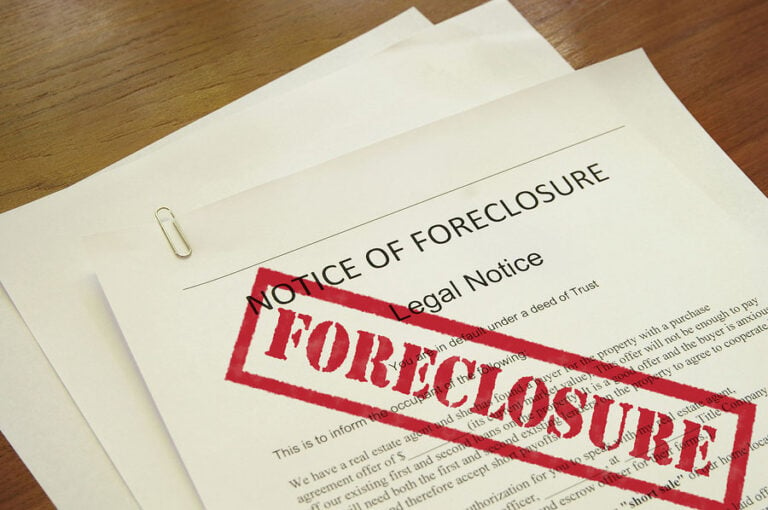Can You Sell a House in Foreclosure (& How to do it Fast!)
If you are facing foreclosure or are concerned that foreclosure may be coming, you are not without options, and we’re here to help you determine the best path forward for you. You naturally have questions, and we have answers for you. Can you sell a house in foreclosure, for example.
The truth is that there are situations in which selling a house in foreclosure is a possibility, and we’re here to fill you in on when it’s advised, how it works, what’s in it for you, and more.
Table of Contents
Can you sell a house in foreclosure in California?
Yes, you can sell a house in foreclosure, but you should not wait until the situation becomes dire before addressing it. The best path forward generally involves selling the house quickly, and working with a real estate investor can help you bypass common pitfalls and expenses – while maximizing your return.
Can you sell a house in pre-foreclosure?
Yes, as the homeowner, you have the right to sell a house that’s in the pre-foreclosure process, but you’ll need to act quickly. The prospect of foreclosure is stressful, and the sales process is complex. Taking early action – before formal foreclosure begins – can lead to significant financial advantages for you.
Selling a home in pre-foreclosure or in actual foreclosure generally involves using the sale proceeds to cover what you owe the lender, including any outstanding payments and attendant penalties.
The benefits include erasing the debt hanging over you while protecting your credit. It is important to note that selling a house before you face foreclosure generally leaves you with much better options than selling a home that is already in foreclosure, but both are possibilities.
Can you help me sell my house fast before foreclosure?
At SoCal Home Buyers, we buy houses for cash in California, and as a result, we can help you sell your home quickly – even if it’s already in foreclosure. Once foreclosure begins, things tend to speed up, and we’ve helped homeowners in situations like yours successfully sell their properties at every point in the foreclosure process.
Our business is buying foreclosed homes, and we have a simplified purchase process that can wrap up the sale of your home quickly, while avoiding all the following obstacles:
- Hiring a realtor
- Preparing the house for sale, including attending to needed repairs and maintenance
- Having open houses and showings
We not only speed up the sales process but also do away with common presale expenses that you would otherwise experience.
How can I sell my house to avoid foreclosure?
There are are several different options when it comes to selling foreclosed homes, let’s take a look at them below.
Work with a realtor
The traditional method of selling a house is working with a real estate agent. This involves preparing the property for sale, listing your home, and scheduling showings with potential buyers before the property sells, which involves a hefty commission for your realtor.
While this is the more traditional route, it is costly, and it may be too lengthy to do you any favors if you are facing foreclosure.
Sell your home yourself
Another option is finding a buyer and selling your home yourself. The fact is, however, that house selling is a complicated process, which can lead to unexpected hurdles that are difficult to successfully maneuver without professional experience backing you up. Attempting to sell your house yourself can leave you more vulnerable to foreclosure.
Sell your home to a real estate investor
At SoCal Home Buyers, we have a thorough understanding of the foreclosure process, and we also appreciate your financial predicament. We are real estate investors who have the resources to buy your house before it goes into foreclosure and is sold at auction – allowing you to reimburse your lender for all missed payments and penalties, salvage your credit score, and move on with your life.
Selling your home before the foreclosure process begins generally involves fewer financial obstacles. If you’re ready to sell your property, we’ll make a fair cash offer that allows you to sell quickly, which comes with significant financial and emotional benefits for you. We encourage you to reach out and discuss scheduling an inspection, which can lead to a speedy sale before your house goes into foreclosure.
Delaying selling a house before foreclosure
Wondering how to stop foreclosure in California? If you are behind on your mortgage payments and are concerned that your house could go up for auction, delaying the foreclosure prior to selling it may be an option, but the time to act is now. If you’re serious about avoiding foreclosure in California, you can still sell your house, and it’s often the best approach.
If you’re invested in saving your home, there may be other actions you can take, but these generally hinge on your ability to make payments moving forward, which may not be a possibility, and how inclined your lender is to strike a deal with you. Consider the following possibilities:
- Catching up on missed payments by paying the lender the amount included on the reinstatement quote
- Paying the amount you can against the months of missed payments and working out a payment plan that satisfies your lender – if they are willing to strike a deal
- Exploring other options to avoid losing your home with your lender, including the possibility of a forbearance, a loan modification, the waiver of late fees, or a short sale.
If you’re facing a foreclosure or fear that you may be soon, relief may be available.
What’s a Short Sale?
A short sale can be an option in those situations in which selling the property would bring in less than the amount that the owner owes on it. If you’re in this situation and your lender chooses to allow a short sale, it requires you to sell the house and hand over the proceeds to the mortgage holder. The bank comes up short, which is where the name short sell comes from, and your credit will be seriously tarnished in the process.
Some banks are partial to short sales over the foreclosure process in California for all the following reasons:
- It’s generally less expensive than foreclosure.
- It can be more difficult to sell a home in a foreclosure auction than it is in a short sale.
- Banks prefer to be paid some of what they’re owed – rather than nothing at all, which can happen with a foreclosure.
- Foreclosures can bring down the market value of other homes in the area, which is bad for business overall.
If you want to know how to short sale your home in California you need to know that in order to qualify to sell a property in a short sale, you’ll need to demonstrate that circumstances like the following apply:
- You are experiencing financial distress, such as losing your job, facing mounting medical bills, inheriting a home you can’t afford to maintain, or having unreliable tenants in a rental.
- The market value of your home is lower than it was when you purchased it.
- You’ve received a notice of default on your home or are likely to receive one soon, which is a clear sign that you’re experiencing financial distress.
- You don’t have any significant assets.
The more difficult your financial situation, the more likely your lender is to offer a short sale.
Can I sell my house during the redemption period?
Yes, you can sell your house during the redemption period, which is part of the judicial foreclosure process. The redemption period refers to a time frame in which you are given the opportunity to redeem yourself financially. The requirements associated with the redemption process, however, are quite strict.
Need help selling a house in foreclosure fast?
If your home is in foreclosure or is headed in that direction, it may be time to sell. Selling a foreclosed home in California is doable, and SoCal Home Buyers welcomes the opportunity to help.
We’re California real estate investors who pay cash for houses like yours – regardless of what kind of shape they’re in and regardless of whether or not they are in foreclosure. If you’re thinking of selling your house in foreclosure, we encourage you to think of us.
We have simplified the sales process to the point that it requires only four easy-to-follow steps, including:
- Give us a call at 951-331-3844—or fill out the short form below—to request your fair cash offer.
- Await our prompt response to discuss your property in greater detail and schedule a one-time inspection that allows us to offer the highest amount possible.
- At the time of the inspection, our in-house inspector will quote you a fair cash offer, and if you’re on board, you can consider your home sold!
- Choose your closing date, and leave the rest to us. You can choose payment via check or wire transfer. It simply doesn’t get any easier.










